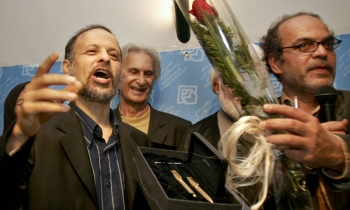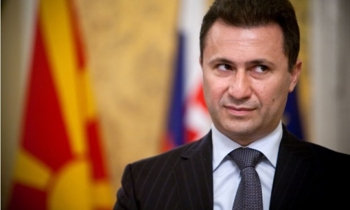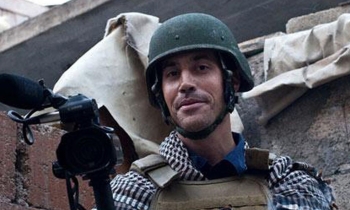ABC News anchor Bob Woodruff was with David Bloom outside Iraq days before the NBC correspondent died of a pulmonary embolism, and he immediately raced home to help Bloom's family with the funeral arrangements -- and to comfort his own wife, Lee, and their four children.
The reason, Woodruff explained to New York's Daily News soon after his friend's death in 2003, is that "they equate my life and situation with Dave's." The families have remained close since then.
When Woodruff left ABC's newsroom last Monday, hauling two suitcases and a computer bag, he betrayed no sense of nervousness about the risk of returning to Iraq, where he and a cameraman, Doug Vogt, were seriously wounded yesterday by a roadside bomb. He talked about deadlines, such as landing in Israel in time to interview Palestinian leader Mahmoud Abbas, and the challenge of sleeping on overseas flights, but not about the danger he knew all too well from repeatedly flying into war zones.
In the four weeks since Woodruff and Elizabeth Vargas became co-anchors of "World News Tonight," ABC has made clear that the new format would keep them constantly on the road. That was just fine with Woodruff, 44, a former London correspondent who reported from Pakistan for four months after the 9/11 attacks and also covered the war in Afghanistan. He was in the midst of his second trip to the Middle East this month and was with an Iraqi army unit when the bomb exploded.
"He is one of the bravest and most rugged and curious journalists I've ever worked with," said former ABC correspondent Linda Douglass. "He came into our bureau, so handsome you couldn't even find the words to describe it, and won everyone over by being hardworking and nice. He has an insatiable desire to get to the story, along with great devotion to his family."
Woodruff saw himself in the mold of Peter Jennings, whom he and Vargas succeeded after the veteran anchor's death from lung cancer last summer. A lawyer by training, he was moved to get into television by the Persian Gulf War, after having spent time as a CBS translator in China following the Tiananmen Square uprising. Since then, Woodruff said last week, his main aspiration has been "to be the best damn foreign correspondent I can be."
"Once it's in your blood, the difference in being on the scene firsthand is dramatic compared to being back at a desk at headquarters," said Donatella Lorch, a former foreign correspondent for NBC and Newsweek. But, she said, "the danger that journalists face in Iraq is really unparalleled. These roadside bombs make you a target regardless of whether you're in the vehicle that's blown up."
Woodruff's injury, following the Jan. 7 kidnapping of Christian Science Monitor stringer Jill Carroll, whose fate remains unknown, underscores the perils for Western reporters in Iraq. According to the Committee to Protect Journalists, 61 have been killed in that country since the 2003 war began, including Michael Kelly, a Washington Post columnist and former editor of the Atlantic Monthly. Others have been kidnapped, shot at and wounded, including Time's Michael Weisskopf, who lost a hand after an explosion.
Ann Cooper, director of the Committee to Protect Journalists, said: "The Pentagon takes every opportunity to say, 'If you're worried about security, travel embedded with us.' This is just a reminder that it's still a very high-risk place," even when reporters are with the troops.
"Personally I feel probably more nervous if I'm driving along in a Humvee, armored or not, because a U.S. convoy or a military convoy of any kind in this country is such a target," CNN correspondent Michael Holmes said from Baghdad yesterday. His car was shot at in a 2004 attack in which his cameraman was wounded in the head and two Iraqi staffers were killed.
"When it happens right on top of you and you are the target, it's very hard to get across the sheer violence of something like that, and terror," Holmes said. "You know, I'm not afraid to admit that. It's an intensely personal and horrific experience."
At ABC News, where the loss of Jennings is still acutely felt, feelings of shock and concern yesterday were tempered by cautious optimism when Woodruff and Vogt were pronounced in stable condition after surgery. Vargas underwent a separate trauma when her husband, singer Marc Cohn, was shot in the head last summer during a carjacking, though he has since recovered.
While media attention to the Iraq conflict has ebbed and flowed as constant casualties have become a fact of life, the spotlight has shone brighter during periodic visits by high-profile anchors.
"It's more and more critical to have your person on the ground," said Lorch, who runs the Knight International Press Fellowships program. "The American audience sees news through a person. They identify with the anchor or correspondent they see every night."
On last night's ABC newscast, Vargas told viewers that "Bob and Doug always take care to balance those risks [in war zones] with the need to report the story. We are very concerned about our friends tonight and their wives and their children."
On CBS's "Face the Nation," anchor Bob Schieffer praised Woodruff's bravery, saying: "Wars are not fought on the training ground, nor can they be covered from a TV studio. They are not reality shows, they are reality. Young men and women have to fight them and correspondents have to cover them if we are to understand what they are about."









